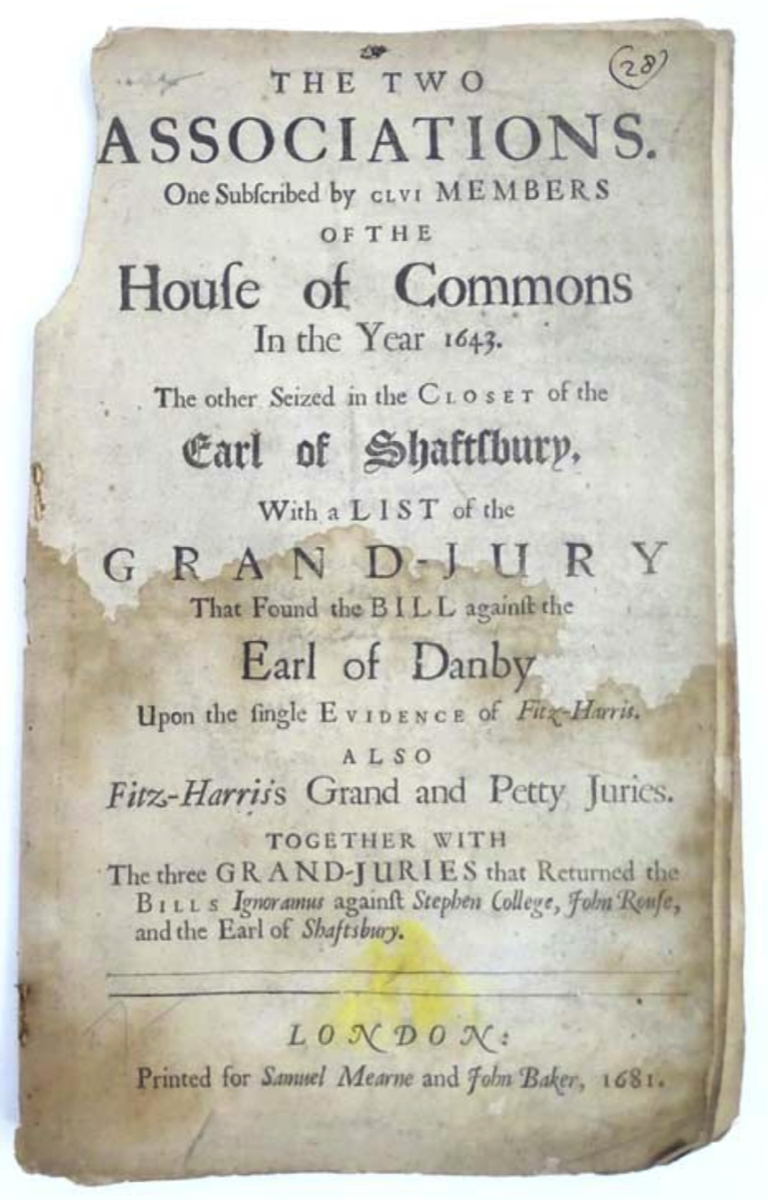Names of the Members of Parliament that took the new Oaths and Covenants agreed on
Tuesday June 6 1643
- With a list of the Grand Jury that found the BILL against the Earl of Danby upon the single evidence of Edward Fitz-Harris.
- Also Edward Fitz-Harris's Grand and Petty Juries.
- List of the three Grand Juries that returned the BILLS Ignoramus against Stephen College, John Rouse, and the Earl of Shaftsbury.
LONDON: Printed for Samuel Mearne and John Baker, 1681

Anthony Ashley Cooper, 1st Earl of Shaftsbury, was arrested in 1681 on suspicion of high treason and committed to the Tower of London. He immediately petitioned the Old Bailey on a writ of habeas corpus, but the Old Bailey said it did not have jurisdiction over prisoners in the Tower of London. Cooper had to wait for the next session of the Court of King's Bench. His case finally came before a grand jury on 24 November 1681 and on 13 February 1682 his case was dropped when the grand jury issued an ignoramus bill - a finding of insufficient evidence to proceed to a jury trial.
Thomas Osborne, 1st Duke of Leeds, Earl of Danby (1632 - 1712) was an English Tory politician and peer. He was a leading figure in the English government during the reign of Charles II until he fell out of favour and was imprisoned for five years in the Tower of London until James II was accessed in 1685. In 1688, he was one of the Immortal Seven who invited William of Orange to depose James II during the Glorious Revolution.
Edward Fitz-Harris was arrested in 1681 for writing a libellous pamphlet advocating the overthrow of Charles II and the exclusion of his brother James. He was held at Newgate prison where he admitted his involvement in catholic conspiracies since 1672 and implicated various other people, including the Earl of Danby. Fitz-Harris was brought before the king at Whitehall and impeached for high treason by the House of Commons.. However the House of Lords refused to proceed with the impeachment claiming he should be tried by common law.
Stephen College, an English joiner and activist Protestant, was charged with high treason in 1681. An initial Grand Jury refused to indict him although he was later found guilty following a second prosecution.
Thomas Osborne, 1st Duke of Leeds, Earl of Danby (1632 - 1712) was an English Tory politician and peer. He was a leading figure in the English government during the reign of Charles II until he fell out of favour and was imprisoned for five years in the Tower of London until James II was accessed in 1685. In 1688, he was one of the Immortal Seven who invited William of Orange to depose James II during the Glorious Revolution.
Edward Fitz-Harris was arrested in 1681 for writing a libellous pamphlet advocating the overthrow of Charles II and the exclusion of his brother James. He was held at Newgate prison where he admitted his involvement in catholic conspiracies since 1672 and implicated various other people, including the Earl of Danby. Fitz-Harris was brought before the king at Whitehall and impeached for high treason by the House of Commons.. However the House of Lords refused to proceed with the impeachment claiming he should be tried by common law.
Stephen College, an English joiner and activist Protestant, was charged with high treason in 1681. An initial Grand Jury refused to indict him although he was later found guilty following a second prosecution.